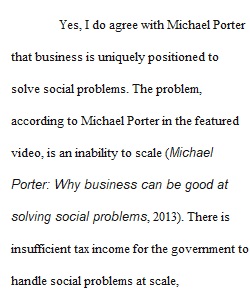


Q Think back to the readings and videos covered in Module 6. For two or more of these questions, share your answers with other classmates. 1. Do you agree with Michael Porter that business is uniquely positioned to solve social problems? 2. What advantages do businesses have over NGO’s and government for solving such problems? 3. What role does profit play in generating such solutions? 4. From your experience, can you provide one or more examples of cases where a business has attempted to address a pressing social problem? How successful was this effort? NOTE: Be sure to answer two or more questions. Your initial posting in response to these questions should be a minimum of one well-developed paragraph and a maximum of three paragraphs. Your responses to classmates must be substantive and add value to the conversation. See the "Rubric for Asynchronous Discussion Participation" for more information on the discussion board expectations and assessment criteria.
View Related Questions